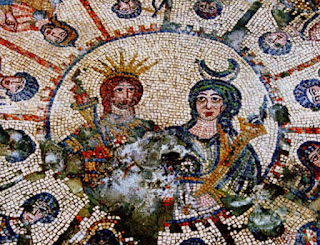Back in the day, lambs were used as a sin offering, to atone for man’s sins. Only unblemished lambs were chosen as the offering. To them, offering a prize lamb was a sacrifice, because it was valued; and just might have been worth its weight in gold to the tribe. This was part of man’s transformation from the flesh into spirit, because once he learned “the animal” needed to be sacrificed, he would come to understand that he would have to sacrifice himself, specifically his animal-side – his selfish egotistical, clever, greedy, take-care-of-me-and-mine self. Once he could do this, man would operate as spirit in this world – be in it, but not of it [A Passer-by man; Gospel of Thomas, 42 Jesus says:You must be as passers-by].
Jesus demonstrated this transformation; and once this lesson was taught, man no longer needed to perform animal sacrifice as a sin offering. This was the only part of God’s LAW that changed [The , or NEW covenant (agreement), not new law].The fact that the animal sacrifices which were put to death, were but types, and "could never take
away sin " for the animals had never sinned (Heb. 10:11). However the nature of the animals is as full of this physical evil principle called SIN as the nature of man; although it cannot be called sin with the same expressiveness; because it does not possess them as the result of their own transgression; the name, however, does not alter the nature of the thing.
The force of these words is seen in that, so far as true believers are concerned, they are not to offer to God something outside themselves. On the contrary, they are to offer themselves to Yahweh
as men and women who are living proof of the Truth at work in themselves, transforming them to "conform to the image of His Son" (ch. 8:29).
Animals were to be brought to the altar alive. "We have an altar", said Paul (Heb. 13:10), "who is Christ". God's saints are "dead unto sin, but alive unto God, through Jesus Christ our Lord... as those that are alive from the dead" (Rom. 6:11, 13).
This type of sacrifice— apparent under the ritual system of the Law of Moses only in type, and therefore hidden from all except those who sought the spirit of the Law — is a spiritual sacrifice, resulting from the enlightenment of the mind to the divine will; the conviction gained therefrom providing the motivation to strive to perform "the acceptable and perfect will of God
sacrifice a refining process that is constantly going on in the consciousness.
The Animal sacrifices on the altar represent the transformation of the conscious to the next higher plane of action. This is a process of reformation that pertains to those who put on the new man.
The altar represents the place in consciousness where we are willing to give up the lower to the higher, the personal to the impersonal, the animal to the spiritual.
We must purify our mind and heart by the Spirit in order to begin the regenerative work. When this blessed realisation of the regeneration comes to consciousness the voices of men are heard by the Lord and their prayers ascend "even unto heaven."
When we have faith in God we are willing to give up all our material pleasures this is a point that is also symbolised by the sacrifices so often referred to in the history of the Children of Israel.











